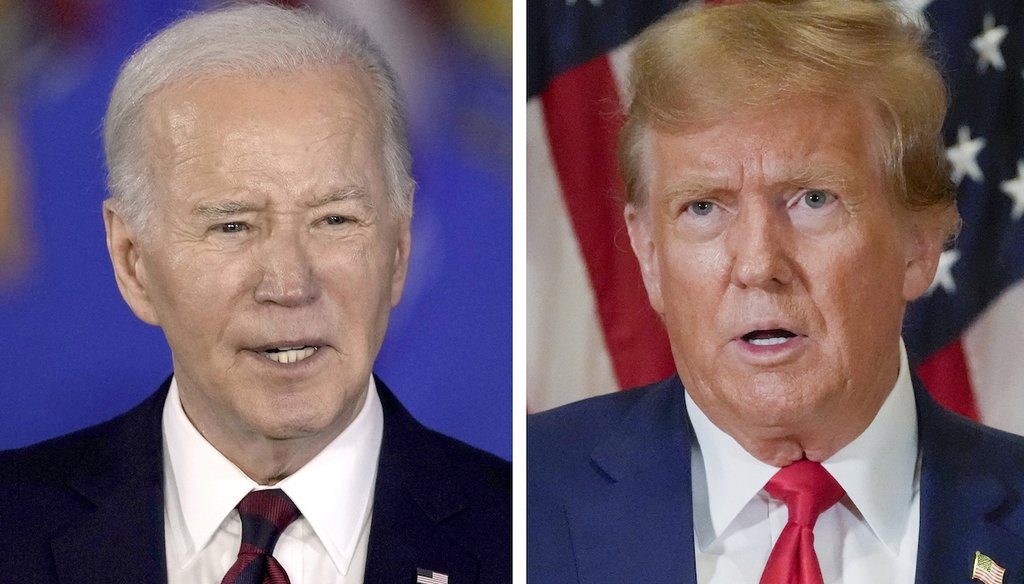Stand up for the facts!
Our only agenda is to publish the truth so you can be an informed participant in democracy.
We need your help.
I would like to contribute

(AP)
If Your Time is short
-
There is no evidence to suggest President Biden has used executive action more than other presidents. Biden had issued 139 executive orders as of July 1.
-
Former President Trump’s 220 executive orders are the most in one term since President Jimmy Carter, whose term ran from 1977 to 1981.
-
Presidents have multiple ways to use executive action, including orders, directives and ceremonial proclamations.
North Dakota Gov. Doug Burgum, a Republican vice presidential contender, has made numerous comments that liken President Joe Biden’s administration to a dictatorship.
On June 23 on CNN’s "State of the Union," Burgum said, "This president, more like any other, has bypassed Congress."
He implied there is a double standard for Biden in his use of executive orders and that of former President Donald Trump.
Burgum said there is "a nonstop media attack on President Trump saying that, ‘Oh, that he might use executive orders when he takes office.’" He followed by saying "the open borders and the inflation are things that (Biden’s) doing by himself alone, ignoring the other branches of government."
CNN’s Kaitlan Collins fact-checked Burgum during the interview, pointing out that Trump signed 220 executive orders during his four years in office, while Biden is at 139 so far in his term.
Sign up for PolitiFact texts
Biden did use executive action at a significantly higher rate than other presidents in his first few days in office, largely a response to the COVID-19 pandemic. But Trump had issued more orders by this time in his presidency — with 169 from Jan. 20, 2017, to July 1, 2020, compared with Biden’s 139, according to a PolitiFact analysis of data provided by the American Presidency Project, a nonprofit source for presidential documents hosted by the University of California, Santa Barbara.
In the CNN interview, Burgum cited Biden’s order on student loan debt relief and federal Environmental Protection Agency regulations on baseload electricity as examples of the president circumnavigating the two other branches of government. He said that Biden "is bypassing the other two branches of government to push an ideological view, whether it's on economics or whether it's on climate extremism." But these both have been through the legal system and Biden has not dismissed the Supreme Court’s rulings on his policies.
A Burgum spokesperson did not respond to PolitiFact’s request for evidence that Biden "bypassed Congress" more than other presidents through executive orders.
According to the American Presidency Project, Collins’ numbers are correct. Trump’s 220 executive orders are the most in a single term since Jimmy Carter issued 320 orders, during his presidency from 1977 to 1981.
Presidents have multiple methods of executive action, including regulations, military orders and proclamations, Kenneth Lowande, a political science and public policy professor at the University of Michigan, said.
Executive orders are the most common and powerful. They are not a perfect metric to see how often presidents have "bypassed Congress," because of the executive branch’s other available powers. Experts say that executive orders do not necessarily mean a president circumvented the other branches, because these are part of the executive branch's implied powers. It is also difficult to tell which actions will have the biggest policy effects.
"It takes years to learn which executive actions were really important, and which were bluster, because so much depends on implementation," Lowande said. "That’s all executive actions are, at the end of the day — orders to bureaucrats."
"One of the complications we warn about repeatedly is relying simply on counts of specific kinds of Presidential Documents as a summary measure of executive action," said John Wolley, co-director of the American Presidency Project and an emeritus political science professor at the University of California, Santa Barbara.
Even so, political science experts say there is no evidence to signal that Biden has bypassed the other two branches of government more than other presidents.
"I do not see Biden’s actions as being materially different from his recent predecessors of either party," said John Frendries, a political science professor at Loyola University Chicago. "Presidents of both parties have relied on EOs to move in certain policy areas."
"I would hesitate to say which president has more often used executive action because of a desire to bypass Congress," Woolley said. "I don't think anybody's done the careful analysis that would be required to make such a statement."
In his statement on CNN, Burgum criticized Biden’s action on the border. However, during Trump’s presidential tenure he, too, used an executive order to push immigration policy.
Biden used executive action in an attempt to secure the border, restricting the number of migrants who can seek asylum between official points of entry. Collins pointed out that Republicans including House Speaker Mike Johnson, R-La., urged Biden to address the border. A proposed bipartisan immigration deal in May failed to advance in the Senate, blocked by Senate Republicans.
Woolley pointed out that Trump had similar issues getting Congressional approval for his proposed border wall. Through executive action, he diverted $3.6 billion from the military budget to fund the wall, but that was challenged in multiple courts. After continuing legal clashes, the Supreme Court declared the case moot in October 2021 because Biden had halted border wall spending.
Biden’s executive order efforts to relieve $430 billion in student loan debt were rejected by the Supreme Court in 2023. But Biden has found other ways to decrease loans by expanding existing regulations within the Department of Education, including the SAVE (Saving on a Valuable Education) program, which lowers monthly payments for low-income borrowers. The 10th U.S. Circuit Court of Appeals ruled July 1 to allow that plan to continue in August after a federal judge in Kansas initially blocked the decreased payments.
Although Frendries underscored that Biden’s original executive order on student loan debt relief involved significantly large-dollar sums, he said "these policy changes were litigated, undercutting any ‘dictatorship’ claim."
Several experts told PolitiFact the Supreme Court ruling July 1 — which gives presidents immunity from prosecution when carrying out "official acts" — could have future implications for presidential power.
This could encourage future presidents to take more executive action than Biden or Trump has.
RELATED: In Context: Donald Trump was asked if he will be a dictator if reelected. Here’s what he said.
RELATED: How Joe Biden’s first executive orders compare with past presidents
Our Sources
AP News, Trump's vow to only be a dictator on 'day one' follows growing worry over his authoritarian rhetoric, December 7, 2023
YouTube, Collins presses Gov. Burgum on his claims that US is 'living under a dictatorship', June 23, 2023
Wall Street Journal, Biden Has Canceled About $138 Billion of Student Loans Despite Supreme Court Ruling. Here’s How, Feb. 21, 2024
U.S. Environmental Protection Agency, Biden-Harris administration dinalizes suite of standards to reduce pollution from fossil fuel-fired power plants, April 25, 2024
The American Presidency Project, Executive Orders, accessed July 1, 2024
PolitiFact, How Joe Biden’s first executive orders compare with past presidents, Jan. 27, 2021
Federal Register, Presidential Documents, accessed July 1, 2024
The American Presidency Project, Biden in Action: the First 100 Days, Accessed July 1, 2024
CNN, Supreme Court blocks Biden’s student loan forgiveness program, June 30, 2023
ABC News, Biden lands temporary win as student loan repayment plan allowed to proceed, July 1, 2024
PolitiFact, What Supreme Court’s immunity ruling means for Trump’s cases and, potentially, future presidents, July 1, 2024
Email interview with John Frendries, political science professor at Loyola University Chicago, July 2, 2024
Email interview with John Wolley, Professor Emeritus of Political Science at University of California, Santa Barbara, July 2, 2024
Email interview with Kenneth Lowande, associate professor of political science and public policy at the University of Michigan, July 3, 2024




























